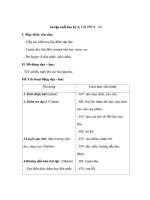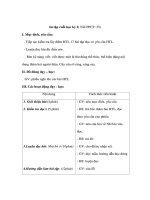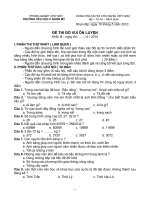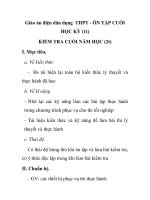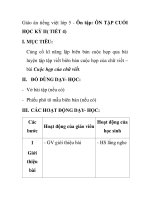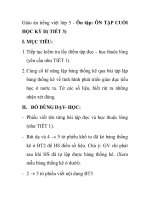4 tiet on tap cuoi hoc ky 2
Bạn đang xem bản rút gọn của tài liệu. Xem và tải ngay bản đầy đủ của tài liệu tại đây (181.8 KB, 9 trang )
Date of preparing
Date of teaching 10a1 10a5
10a6 10a7
Period:
REVIEW FOR THE SECOND TERM
Lesson 1
I . Aims. To guilde students know and practice about the “ the conditional
sentences and the passive voice”
A .GRAMMAR
I. Conditional sentences
1. Conditional sentence: Type 2:
If + S + V2/ed (be were) … , S + would/ could + Vo …
Ex: I don’t have free time, so I can’t help him.
If I had free time, I would help him.
2. Conditional sentence: Type 3:
. If + S + had + V3/ed … , S + would/ could + have + V3/ed …
Ex: I didn’t have free time, so I couldn’t help him.
If I had had free time, I would have helped him.
1. The wind is blowing hard, so I can’t take the boat out for a ride.
If ___________________________________
2. He didn’t prepare for the interview, so he didn’t get the job.
If ________________________________________
3. I can’t take much exercises because I don’t have enough free time.
If _____________________________
4. She didn’t phone you. She came here.
If ____________________________________________
5. You learn hard. You get the scholarship.
If ____________________________________________
6. Stop talking or you will be punished by your teacher.
If ____________________________________________
7. Today isn’t Sunday. The pupils don’t have school off.
If _____________________________________________
8. She can’t buy that bike. She doesn’t have enough money.
If ______________________________________
9. I didn’t know your address, I didn’t write to you.
If ____________________________________________
10. John isn’t intelligent. He can’t solve that math test.
If _____________________________________________
11. Her family was poor, so she could not continue to her college study.
If _______________________________________
12. I took the job because I didn’t know how difficult it was.
If _________________________________________
13. We got lost because we didn
’
t a map.
If_______________________________________________
14. The match can be cancelled because it rains heavily.
If__________________________________________________
15. He wasn't able to watch the cup final because he didn't have a ticket.
If ________________________________________
16. My parents do not allow me to do, so I have to stay at home.
If__________________________________________________
1
1
II. Passive voice :
Active: S + V + O (place) (time)
Passive: S + BE + V3/ed + (place) + (by O) + (time)
Active Passive
S + V1/Vs,es + O S + am/is/are + V3/ed + by + O
S + am/is/are + V-ing + O S + am/is/are + being +V3/ed + by + O
S + has/have + V3/ed + O S + has/have + been + V3/ed + by + O
S + V2/ed + O S + was/were +V3/ed + by + O
S + was/were + V-ing + O S + was/were + being +V3/ed + by + O
S + had + V3/ed + O S + had + been + V3/ed + by + O
S + will/shall + Vo + O S + will/shall + be +V3/ed + by + O
Ex: - Active: She arranges the books on the shelves every weekend.
Passive: The books are arranged on the shelves (by her) every weekend.
- Active: They have built a new bridge across the river.
Passive: A new bridge has been built across the river (by them).
- Active: Mai was watching a cartoon at 8 o’clock last night.
Passive: A cartoon was being watched by Mai at 8 o’clock last night.
1. We use the computer to learn languages.
__________________________________________________.
2. Have you fed the dogs yet?
__________________________________________________.
3. Somebody has taken my briefcase.
__________________________________________________.
4. Mary will phone her aunts tomorrow.
__________________________________________________.
5. People teach English in schools of almost every nation.
__________________________________________________.
6. Oliver has drawn these beautiful pictures.
__________________________________________________.
7. Someone has broken the glass window.
__________________________________________________.
8. Farmers are cutting a lots of trees for wood.
__________________________________________________.
9. They were building a new bridge across the river.
__________________________________________________.
10. That robber killed three officers in the bank lastnight.
__________________________________________________.
II . Consolidation and homework
2
2
Date of preparing
Date of teaching 10a1 10a5
10a6 10a7
Period:
REVIEW FOR THE SECOND TERM
Lesson 2
I . Aims. To guilde students know and practice about the “ Wh –questions
,adjective of attitude ,and It was not until.… that…
/ Wh- questions :
(+)S + V1-> Wh- + do + S + V1…?
(+)S + Ve,es…-> Wh_ + does + S + V1….?
(+)S + V2/Ved… > Wh- + did + S + V1….?
(+)S + tobe… > Wh_ + tobe + S….?
(+)S + have/has + V3/Ved… > Wh_ + have/has + S + V3/Ved….?
(+)S + had + V3/Ved… > Wh_ + had + S + V3/Ved….?
(+)S + mod + V1… > Wh_ + mod + S+ V1….?
Exercise:
3
3
1. I practice speaking English to sing English songs.
…………………………………………………………………………………………………………………………
2. Music
makes people different from all other animals.
…………………………………………………………………………………………………………………………
3. I like listening to music at night.
………………………………………………………………………………………………………………………
4. Every day I go to school by bicycle.
__________________________________________________________?
5. Our teacher lives in a small house in this town.
__________________________________________________________?
6. The farmers are working in the field now.
__________________________________________________________?
7. She went to market so as to buy some bread.
__________________________________________________________?
8. The boy was glad because he was given presents.
__________________________________________________________?
9. We have English classes three timesweek.
__________________________________________________________?
10. It often takes him 15 minutes to go to his office.
__________________________________________________________?
11. He has been living her for all his life.
12. She was watching TV in her room.
13. Because of the storm, they canceled the games.
14. There were about one hundred people at the meeting
15. We are borrowing money to buy a house.
16. The building in twenty five meters high.
17. It takes me about five minutes to walk to school.
18. It is twenty miles from here to Bristol.
19. Larry went fishing almost every week.
20. We lived in Manchester before moving to Yorkshire.
11. They are going to build the new hospital next year.
12. We are waiting for the newcomers.
V. Adjective of attitude :
Tính từ chỉ thái độ -ed/ -ing ( một số động từ khi thêm Ing/ ed có thể dùng như tính từ)
-Tính từ tận cùng -ing: mang tính chủ động, chỉ tính chất gắn liền với người hoặc vật, sự việc, tính chất có
thể tác động lên đối tượng khác.
- Tính từ tận cùng -ed: mang tính bị động, chỉ cảm giác ( thường là của người) do bị đối tượng khác tác
động.
Ex: I am interested in the film > The film made me interested.
Ex: I find the film very interesting > The film is very interesting > It is an interesting film.
1. She was (disappoint) ………………………in the movie. She had expected it to be better.
2. Are you (interest)………………… in that movie? – Yes, it is really(interest)………………
3. The football match made us (excite)……………………
4
4
4. It’s sometimes ( embarrass) …………….when you have to ask people for money.
5. I found the film ( terrify)……………. Afterwards everybody was (shock)……….
6. I had never expected to get the job. I was ( amaze) …………when it was offered to me.
7. Why do you always look so( bore)………….? Is your life really so (bore)………….
8. She felt ( please) …………… to hear that her son got the scholarship.
9 .I thought the program on was (fascinate). ……I was absolutely (fascinate)……………………
10. The thunder made the children ( scare)…………………
VI. . It was not until…… that ……:
It was not until + time…… that + clause (S + V2/ed)……
Ex: The cinema did not become an industry until 1915.
It was not until 1915 that the cinema became an industry.
1. We did not study English until we began lower secondary school.
It was not until ……………………………………………………………………………………………….
2. He didn't stop drinking until he got part of his stomach removed
…………………………………………………………………………………………………………………
3. We couldn't make him change his mind until his teacher talked to him.
………………………………………………………………………………………………………………….
4. Tom didn't go to bed until he could solve the math problems.
……………………………………………………………………………………………………
5. No one could leave the cinema until the film finished.
……………………………………………………………………………………………….
6. They didn’t return their home land until the war ended
………………………………………………………………………………
7. I couldn’t cook until I was 18 years old.
……………………………………………………………………………………
8. He didn’t come back home until his father called.
……………………………………………………………………………….
II . Consolidation and homework
Date of preparing
Date of teaching 10a1 10a5
10a6 10a7
Period:
REVIEW FOR THE SECOND TERM
Lesson 3
I . Aims. To guilde students know and practice about the “ article ,will and be
going to and the comparions”
Put in a/ an / the where necessary. :
1. a/ an: được dùng trước một danh từ số ít đếm được, chúng có nghĩa là một, chúng được dùng trong câu
có tính khái quát hoặc khi chủ thể được đề cập LẦN ĐẦU TIÊN. “AN” đứng trước nguyên âm (a, o, e, u, i)
e.g: A ball is round. ( Nghĩa chung, khái quát, chỉ tất cả các quả bóng)
e.g: I saw a boy on the street. ( chúng ta không biết cậu bé nào, chưa được đề cập đến trước đó)
2. the: Khi danh từ đó được nhắc đến kể từ LẦN THỨ HAI, hoặc được xác định qua ngữ cảnh ( được xác
định cụ thể về mặt tính chất, đặc điểm, vị trí), hoặc về một khái niệm phổ thông. mọtt thứ duy nhất tồn tại ai
cũng biết
Ex: - I have a pencil and an eraser. The pencil costs 3,500 VND and the eraser is 2,000 VND.
- The boy in the corner is my friend. ( Cả người nghe và người nói đều biết đó là cậu bé nào)
5
5
- The earth is round. ( Chỉ có một trái đất ai cũng biết).
3. Với danh từ khơng đếm được, dùng the khi nói đến vật cụ thể, khơng dùng the khi nói chung
e.g: Sugar is sweet.
The sugar on the table is from Cuba.
4. Với danh từ đếm được số nhiều, khi chúng mang nghĩa đại diện chung thì khơng dùng the:
e.g: Oranges are green until they are ripe.
5. The: Dùng trước những tính từ so sánh bậc nhất hoặc trước cụm danh từ có only, f irst, last:( e.g: the last
thing, the first person, the only way, the best car.)
1. Mandela was born in ………….South Africa
2. Is there ……… public telephone near here ?
3. My father often has ……… sandwich for …………… lunch
4. He drinks …………cup of coffee …………breakfast
5. ………fishes live in ……… water
6. ……….sun rises in …………East
7. It was ……….long flight , but finally we arrived in ……… Paris
8. Dr John is ………… most insufferable person I know
9. What ………….expensive shirt !
10. There are ………… egg and ………… tomato on ……… table.
VIII. will vs. be going to :
1. be going to: diễn tả một dự định.
Ex: A: Why are you turning on the TV? -B: I’m going to watch the news.
2. Will : diễn tả một quyết định đưa ra vào lúc nói; một phỏng đốn, một đề nghị.
Ex: A: I want to buy this book but I don’t have enough money. -B: I’ll lend you some.
Ex: You are working very hard. I am sure you will pass this exam easily.
Ex: A: It’s very cold. -B: I’ll close the windows.
Complete the sentences with be going to or will + one of these verbs:
be (2), come, get, like(2), play, meet, pass, travel, walk, buy .
1. I ______________with Tim in the park tonight .He asked to be there at 7.00
2. Don't worry about your exam. I'm sure you _______________.
3. Why don't you try on this dress? It, _______________ nice on you.
4. You must meet George sometime. I think you _______________ him.
5. It's raining. Don't go out. You _______________ wet.
6. They've invited me to their house. They _______________ offended if I don't go.
7. He bought two rackets . He ____________tennis tomorrow
8. I've invited Sue to the party but I don't think she _______________.
9. – What _____________you_________ Jean for her birthday
I ________________her a book about wild life I think she ___________it.
10. They have some days off. They ____________________to DaLat.
Comparison:
I. Comparison of equality: So sánh b ằ ng
1. Affirmative: as + adj/adv + as (bằng/như)
Ex: - I’m as tall as Tom.
- John works as hard as his father.
2. Negative
not as/so + adj/adv + as (không bằng/như)
II. Comparative of adi/ adv: so sánh h ơ n
1. Short adj/ adv: adj/adv + ER + than
Tính từ/trạng từ ngắn là từ có một vần hay hai vần tận cùng bằng “y”:fast, cold, , lucky, happy .…
2. Long adj/ adv: more + adj/adv + than
Tính từ/trạng từ dài là từ có hai vần trở lên.:modern, patient, difficult, fluently, beautifully, …
III. Superlative of adj/ adv: so sánh h ơ n nh ấ t:
1. Short adj/ adv: the + adj/adv + EST
2. Long adj/ adv: the + MOST + adj/adv
6
6
II . Consolidation and homework
Date of preparing
Date of teaching 10a1 10a5
10a6 10a7
Period:
REVIEW FOR THE SECOND TERM
Lesson 4
I . Aims. To guilde students know and practice about the “ Relative clauses and
althought,thought and inspite of ,dispite”
Relative clauses :
1. Defining relative clauses:
Ex: I saw the girl. She helped us last week.
I saw the girl who/that helped us last week.
Ex: The book is very interesting. I bought it last week.
The book which/ that I bought last week is very interesting.
2. Non-defining relative clauses:
Ex: My father is a doctor. He is fifty years old.
My father, who is fifty years old, is a doctor.
7
7
Ex: New York is a large harbor. It is ice-free in all seasons.
New York, which is ice-free in all seasons, is a large harbor.
1. My girl friend is now in hospital. She was injured in the accident.
………………………………………………………………………………….
2. A man told me you were away. He answered the phone.
………………………………………………………………………………….
3. That waitress was very impolite and impatient. She served us.
………………………………………………………………………………….
4. A building was destroyed in the fire. It has now been rebuilt.
………………………………………………………………………………….
5. I saw the man. You have just talked about him.
………………………………………………………………………………….
6. Mr. Fed is happy. His son won the race.
………………………………………………………………………………….
7. We are studying sentences. They contain adjective clauses.
………………………………………………………………………………….
8. The taxi driver was friendly. He took me to the airport.
………………………………………………………………………………….
9. Mr .Tam has a good voice. He usually sings at the concert.
………………………………………………………………………………….
10. We enjoyed the actors. His performances are very attractive.
………………………………………………………………………………….
11. These students are in my class. I am walking with them.
…………………………………………………………………………………
12. I’ve spoken to John. His house was burgled last Monday.
……………………………………………………………………………….
Although/ Though vs. In spite of/ Despite :
1. Although/ Though:
Although/ Though + S + V ……., S + V …….( S + V …….although/ though + S + V …….)
Ex: Although New York is not the capital of the USA, it is the centre of global finance.
(New York is the centre of global finance although it is not the capital of the USA).
2. In spite of/ Despite:
In spite of/ Despite + N/ V-ing…, S + V ….( S + V…… in spite of/ despite + N/ V-ing…….)
Ex: In spite of not being the capital of the USA, New York is the centre of global finance.
(New York is the centre of global finance in spite of not being the capital of the USA).
Ex: Despite his age, he works extremely hard.
(He works extremely hard despite his age).
1. In spite of his sickness, he went to work.
Though___________________________________________
2.Though the weather was bad, we decided to go camping.
Despite_____________________________________________
3. Although there was a traffic jam, He came to the office late.
In spite of ___________________________________________
4. Although the house isn’t new. We are going to buy it.
Despite ___________________________________________
5. They didn’t buy the house in spite of having enough money.
Even though __________________________________________
6. In spite of not being a good student, he finished the exam well.
Though______________________________________________
7. In spite of the hard work , they enjoyed doing it.
Though___________________________________________
8.She accepted the job although the salary is low.
Despite_____________________________________________
9. We went to school on time despite the heavy traffic.
Although ___________________________________________
8
8
10. Although being hungry, we didn’t eat anything.
Despite ___________________________________________
II . Consolidation and homework
9
9

